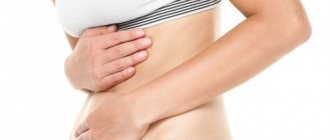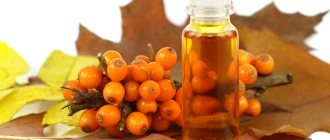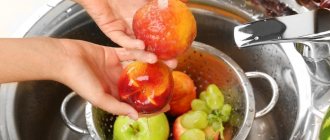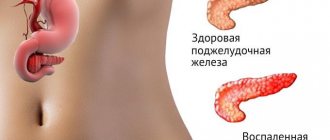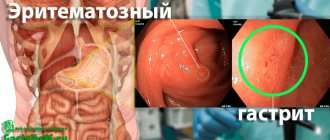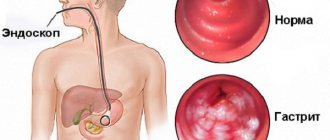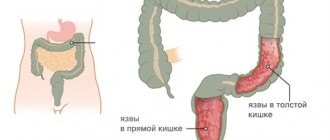Exacerbation of a gastric ulcer is a complication characterized by a violation of the integrity of the mucous membrane, through the formation of ulcers, which over time can penetrate into the deeper layers of this organ, which can lead to serious pathologies.
- Etiology
- Varieties
- Symptoms
- Diagnostics
- Treatment
- Complications
It should be noted that the disease occurs in two forms - acute and chronic. It is the chronic course that is characterized by the manifestation of an exacerbation stage, in which a clear expression of symptoms is observed. There are several predisposing factors that lead to exacerbation of stomach ulcers. The most important of them are the pathological influence of the bacterium Helicobacter pylori, unhealthy lifestyle and unhealthy diet.
The appearance of symptoms of the disease in most cases comes as a surprise to a person, since he may not even suspect that he has such an illness. A third of patients are asymptomatic. The main external manifestations include severe pain, bowel dysfunction and heartburn.
Treatment of this condition is carried out by conservative methods of therapy and consists of taking medications, following a gentle diet, and using folk recipes.
What affects the frequency of attacks?
This is a number of factors that depend or do not depend on a person:
- spring/autumn. Seasonal exacerbation applies to all chronic ailments;
- alcohol;
- smoking;
- the appearance of prohibited foods in the diet;
- binge eating;
- stress and anxiety;
- frequent use of non-steroidal anti-inflammatory drugs;
- decreased immunity;
- excessive physical activity.
Doctors insist that, to a greater extent, exacerbations occur precisely after overeating and repeated consumption of foods prohibited by the diet for ulcers.
Causes
Exacerbation of gastric ulcer occurs for two main reasons:
- Significant increase in gastric acidity.
- Penetration of the pathogenic bacterium Helicobacter pylori into the body. In 80% of cases, peptic ulcer disease occurs precisely as a result of the active activity of this microorganism.
As a result, the protective properties of the gastric mucosa are weakened and first erosions and then full-fledged ulcers appear on the walls of the organ. Favorable conditions for exacerbation of gastric and duodenal ulcers arise under the influence of the following factors:
- smoking;
- eating hot food;
- excessive physical activity;
- neglect of dietary standards;
- infectious lesions, including those of the gastrointestinal tract;
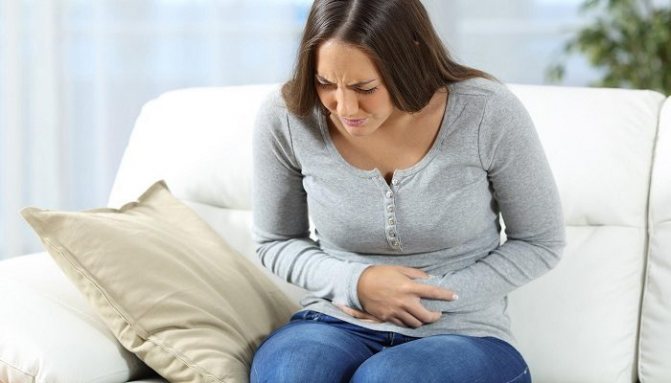
- frequent consumption of strong coffee or tea (any hot drinks also weaken the protective properties of the mucous membrane);
- long-term treatment using aggressive drugs.
Important! The main reason for complications of ulcers is a banal non-compliance with the recommendations of specialists. Many patients do not take treatment seriously, stopping therapy when their condition improves. This approach is fraught with exacerbations and the development of serious complications.
Symptoms and signs
The symptoms of a stomach ulcer attack can vary in severity depending on the individual situation. It is important not to ignore even the slightest discomfort.
- pain in or under the stomach;
- muscle tone in the abdominal area;
- sweating;
- in the stomach: heaviness, nausea, sour vomiting, after which relief comes for a short period;
- problems with bowel movements.
All these symptoms, if responded to inappropriately, threaten the development of ulcer perforation and bleeding. Therefore, it is so important to provide the patient with first aid during an exacerbation.
GALINA SAVINA: “How easy it is to cure a stomach ulcer at home in 1 month. A proven method is to write down the recipe. » Read more >>
A person requires emergency medical care if they have tar-colored or bloody stool or vomit in the form of coffee grounds.
Stages of pathology
This pathology has a number of stages:
Mild exacerbation. Appears once within two years. It proceeds without complications, is blocked quickly, within 7 days. Over the next week of intensive treatment, symptoms disappear and the ulcer heals.
Moderate exacerbation. It occurs at least twice a year. Accompanied by severe symptoms that last up to 3 weeks. The difficulty lies in the bleeding that occurs. The patient needs to change his lifestyle.
Exacerbation of the severe stage. It appears more often than twice a year. Symptoms include perforation of the ulcer, significant weight loss in the patient, bleeding, and degeneration of the ulcer into cancer.
First aid to a patient
The first thing the patient needs to do is to provide physical and emotional peace and lie down. Next, if the ulcer has already been diagnosed, take a painkiller prescribed by the doctor from the group of antispasmodics (Nise, Nabumetone, No-Shpa, Papaverine, Nimesulide).
Taking Aspirin, Ibuprofen, Naproxen, and other anti-inflammatory drugs is strictly contraindicated - they destroy the mucous membrane and can provoke complications of an attack.
Therefore, if someone has a painkiller at hand, and its trade name does not tell the patient anything, then you need to carefully read the composition of the drug and contraindications for taking it if the necessary drugs are not nearby. For a while, until the condition stabilizes, you need to stop eating.
If the acidity of gastric juice is increased, it will be important to take antacids: Rennie, Maalox, Gestal. Contrary to popular belief that baking soda helps reduce acidity, in the event of an attack of an ulcer, it is strictly prohibited to take it - this will only worsen the symptoms that arise.
If at this stage the person feels better, then for the next month he will need to adhere to a strict diet, excluding any irritants to the gastrointestinal mucosa.
One of the most effective folk remedies during an ulcer attack:
- fresh chicken yolk – 1 pc.;
- cocoa powder – 1 tbsp. l.;
- honey of any consistency - 1 tbsp. l.;
- butter – 1 tbsp. l.
The ingredients are mixed until smooth. The patient should take this mixture every three hours. Eating is possible only after 30 minutes. It is noteworthy that regular use of this medicine for two weeks helps to significantly delay the next exacerbation.
If the patient feels too strong, dagger-like pain in the epigastric area, then you should immediately call an ambulance and in no case, even after the situation has been stabilized by doctors, refuse hospitalization. The dynamics of exacerbation of an ulcer sometimes cannot be predicted.
If the patient is faced with an exacerbation situation for the first time, then no warm heating pads should be placed on the sore stomach. Only a doctor can confirm or refute the diagnosis of an attack, and in some cases with similar symptoms, heat can lead to irreversible consequences in the body.
If the symptoms described above appear, it will be useful to drink 100 ml of fresh potato juice, or a little warm milk, or flax decoction. Such a drink will help soothe the walls of the mucous membrane in the future, at the end of the acute phase.
The end of the acute phase is called a fading exacerbation. This is the period when the patient no longer feels disturbing symptoms, but hardware diagnostics still confirm the attack.
How can I help you
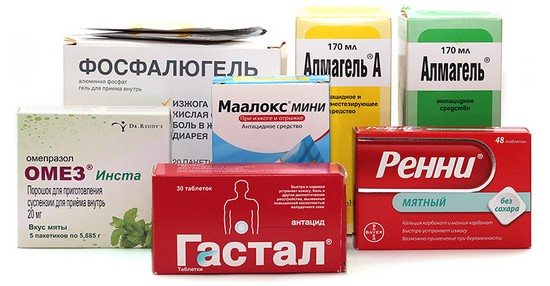
Only a doctor should treat an ulcer. He prescribes antiulcer drugs, which also include antibiotics, since Helicobacter pylori is most actively involved in inflammation of the mucous membrane and ulcer formation. But if you find unbearable pain in the stomach at home, you need to take something that eliminates this pain. And then see a doctor. Drugs that can help:
- Antacids: Almagel, Maalox - 30 minutes before meals.
- Antisecretory: Omeprazole, Lansoprazole, Rabeprazole – 1-2 capsules per day.
- Belladonna preparations: Besalol, Bellastesin.
- Antispasmodics: No-Shpa, Drotaverine
- Anticholinergics: Gastrocepin, Famotidine, Kvamatel.
The patient needs to be reassured, put to bed, and how he is feeling. If the symptoms manifest themselves violently, hospitalization is the best solution. Even if the pain has subsided or gone, visiting a doctor is a must! It is possible that treatment will be prescribed on an outpatient basis or with a visit to a day hospital. Treatment is almost the same as for gastritis. Only, given that damage occurs to all layers of the gastric wall, treatment requires great responsibility and diligence on the part of the patient to comply with all recommendations and prescriptions. Depending on the etiological factors, two strategic directions in treatment have been identified: therapy by eradicating HP in cases of ulcers associated with Helicobacter, and the second by reducing the secretion of gastric juice.
In the first case, there are 2 eradication schemes:
- First line - triple therapy for 7 days: proton pump inhibitor (PPI): Omeprazole or its analogue, Amoxicillin and Clarithromycin or Metronidazole - taken twice a day.
- The second line is quadruple therapy: PPI + two indicated antibiotics (we change one of them to Tetracycline) + bismuth drug (De-Nol).
Second-line therapy is used when the first is ineffective. You can use combination drugs: Gastrostad, Pilobact neo, Ornistat.
In the second case, antisecretory therapy with PPIs and antacids is carried out; the use of bismuth preparations (Bismol, De-Nol, Bismofalk, Vikalin) has a good effect. They protect the mucous membrane from damage and relieve inflammation. De-Nol, in addition, has a bactericidal effect. When treating all ulcers, add, if necessary, antispasmodics, drugs that normalize gastric motility (Motilium, Cerucal), antipsychotics (Eglonil), cytoprotectors (Venter, Sucrafil), drugs that improve ulcer healing: Solcoseryl, Actovegin.
We remind you that only a doctor can make appointments! And if unbearable pain occurs, the stool turns black, and there is blood in the vomit, call an ambulance immediately. Bleeding is life-threatening.
Treatment
After scientists established a common cause for the development of peptic ulcers of the gastrointestinal tract - the bacterium Helicobacter pylori, treatment became more effective.
The first thing therapy begins with is antibiotics. They are prescribed together with other drugs that provide mucosal protection. The full course ensures the absence of attacks of ulcers for many years, and with proper and disciplined compliance with all doctor’s instructions – for life.
The most important condition for the absence of exacerbations is adherence to the diet. In order for the patient not to feel discomfort in the abdomen, it is necessary to avoid starvation, but you should not overeat.
- marinades, pickles;
- sour vegetables, fruits, dairy products;
- tomatoes, cucumbers - especially during an exacerbation;
- fresh garlic, onions, hot spices;
- smoked meat;
- fried foods;
- fresh baked goods, baked goods;
- coffee, strong black tea;
- dumplings, canned food and other store-bought semi-finished products.
This list will expand significantly if the patient’s individual intolerance to certain products is identified. For example, when you have an ulcer, it is often recommended to drink a little warm milk. Indeed, it has a good effect on the walls of the gastric mucosa, but after 20 years the amount of the enzyme that processes it decreases. Therefore, flatulence, bloating, and diarrhea occur.
Of course, treating an ulcer will be a wasted effort if the patient cannot give up smoking and drinking alcoholic beverages. It has been proven that after a week of quitting smoking, patients stop having stomach pains that have been bothering them for a long period.
Allowed for use:
- liquid-like pureed soups. However, since they are high in carbohydrates, their consumption should be moderate;
- porridge of viscous consistency. Oatmeal, rice, buckwheat are suitable for this;
- mashed potatoes - it coats well the mucous membrane of the stomach and intestines, thus also performing a protective function;
- boiled or steamed vegetables;
- weak herbal teas.
A more extensive menu will be suggested by the attending physician, taking into account the individual characteristics of the course of the disease and the level of acidity of gastric juice.
Reason 3. Lack of mucus lining the stomach
Antidote : dishes containing plant mucus. It is released when oatmeal, barley, rice, and barley are boiled. Start your day with milky oatmeal made from rolled oatmeal flakes. Add wheat germ flakes to the prepared hot porridge.
Then you can indulge in any salad made from raw vegetables or fruits, because plant mucus has strengthened the protective barrier of the stomach. Tomatoes contain quite a lot of mucous irritants, but they can be eaten if they are ripe and non-acidic, such as ox heart. Also add cereals to vegetable soups, then even pickle soup will not harm your stomach.
Preventive measures
In order to prevent the development of peptic ulcer disease, and not to suffer from exacerbations from time to time, you need to adhere to simple rules of prevention:
- eat regularly and well. It is nutrition that ensures the normal functioning of the gastrointestinal tract;
- try to drink alcohol in minimal quantities;
- keep your psycho-emotional state under control. Frequent stress, or too acute a negative reaction to certain ongoing events, brings a person closer to a state close to an ulcer;
- avoid frequent overeating;
- Do not self-medicate with medications. We are talking about non-steroidal anti-inflammatory drugs. It is they, and a number of other drugs, that, if used incorrectly, have a detrimental effect on the mucous membrane of the stomach and intestines.
Consequently, an attack of peptic ulcer disease occurs as a result of a person’s deviation from the rules of lifestyle and nutrition during this disease.
In most cases, the patient can independently take measures to eliminate painful symptoms, while some of them serve as a reason to seek emergency medical help.
Peptic ulcer is a chronic disease of the stomach or intestines. From time to time it enters an acute phase of its development. The frequency of such exacerbations depends on the lifestyle and nutrition of the patient himself. It is necessary to learn to recognize an attack of an ulcer in time so as not to provoke irreversible consequences.
What affects the frequency of attacks?
This is a number of factors that depend or do not depend on a person:
- spring/autumn. Seasonal exacerbation applies to all chronic ailments;
- alcohol;
- smoking;
- the appearance of prohibited foods in the diet;
- binge eating;
- stress and anxiety;
- frequent use of non-steroidal anti-inflammatory drugs;
- decreased immunity;
- excessive physical activity.
Doctors insist that, to a greater extent, exacerbations occur precisely after overeating and repeated consumption of foods prohibited by the diet for ulcers.
Complications of stomach ulcers
An attempt without appropriate treatment to wait out an exacerbation, which usually occurs in the fall or spring, can result in complications that pose a threat to life:
- The gastric walls are destroyed (penetrations).
- Holes appear in the gastric wall (perforations).
- Oncological diseases (malignancy) develop.
- Bleeding occurs.
- Pyloric stenosis develops.
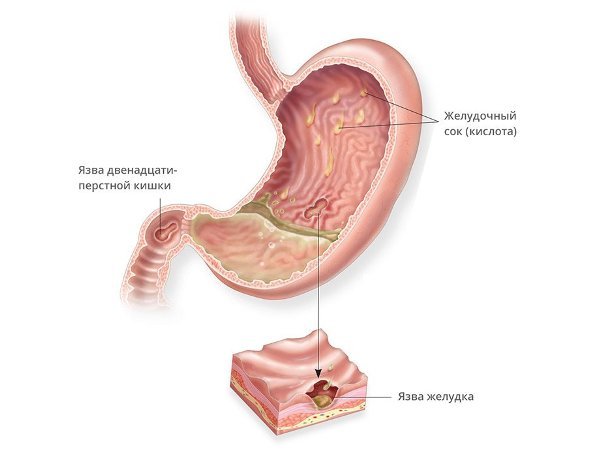
Symptoms and signs
The symptoms of a stomach ulcer attack can vary in severity depending on the individual situation. It is important not to ignore even the slightest discomfort.
- pain in or under the stomach;
- muscle tone in the abdominal area;
- sweating;
- in the stomach: heaviness, nausea, sour vomiting, after which relief comes for a short period;
- problems with bowel movements.
All these symptoms, if responded to inappropriately, threaten the development of ulcer perforation and bleeding. Therefore, it is so important to provide the patient with first aid during an exacerbation.
A person requires emergency medical care if they have tar-colored or bloody stool or vomit in the form of coffee grounds.
First aid
Many patients are interested in what to do if a stomach ulcer worsens? Very often, the disease occurs suddenly, and in this case it is necessary to act immediately. First aid for an exacerbation involves the following actions:
- The patient should be kept at rest. Physical activity during an exacerbation is prohibited.
- Eating is temporarily prohibited. Further nutrition occurs in accordance with a strict diet determined by a specialist.

- If severe pain occurs, it is necessary to apply a cold heating pad to the abdominal area, since a perforated ulcer may occur, accompanied by internal bleeding.
- Let's take painkillers.
- If the patient's condition does not improve within 15 minutes, call an ambulance.
Important! If a patient’s stomach ulcer has worsened, then this condition cannot be ignored.
First aid to a patient
The first thing the patient needs to do is to provide physical and emotional peace and lie down. Next, if the ulcer has already been diagnosed, take a painkiller prescribed by the doctor from the group of antispasmodics (Nise, Nabumetone, No-Shpa, Papaverine, Nimesulide).
Therefore, if someone has a painkiller at hand, and its trade name does not tell the patient anything, then you need to carefully read the composition of the drug and contraindications for taking it if the necessary drugs are not nearby. For a while, until the condition stabilizes, you need to stop eating.
If the acidity of gastric juice is increased, it will be important to take antacids: Rennie, Maalox, Gestal. Contrary to popular belief that baking soda helps reduce acidity, in the event of an attack of an ulcer, it is strictly prohibited to take it - this will only worsen the symptoms that arise.
If at this stage the person feels better, then for the next month he will need to adhere to a strict diet, excluding any irritants to the gastrointestinal mucosa.
One of the most effective folk remedies during an ulcer attack:
- fresh chicken yolk – 1 pc.;
- cocoa powder – 1 tbsp. l.;
- honey of any consistency - 1 tbsp. l.;
- butter – 1 tbsp. l.
The ingredients are mixed until smooth. The patient should take this mixture every three hours. Eating is possible only after 30 minutes. It is noteworthy that regular use of this medicine for two weeks helps to significantly delay the next exacerbation.
If the patient is faced with an exacerbation situation for the first time, then no warm heating pads should be placed on the sore stomach. Only a doctor can confirm or refute the diagnosis of an attack, and in some cases with similar symptoms, heat can lead to irreversible consequences in the body.
If the symptoms described above appear, it will be useful to drink 100 ml of fresh potato juice, or a little warm milk, or flax decoction. Such a drink will help soothe the walls of the mucous membrane in the future, at the end of the acute phase.
The end of the acute phase is called a fading exacerbation. This is the period when the patient no longer feels disturbing symptoms, but hardware diagnostics still confirm the attack.
What first aid is needed during an attack of an ulcer?
What should you do if you have an ulcer while you are waiting for a doctor? Complete rest is important; it is better to take a horizontal position.
Non-acidic drinks are acceptable, but it is better to refuse food.
Do not try to apply temperature to the sore spot - neither a heating pad nor an ice compress will bring relief, but can provoke even greater problems.
If you are an experienced patient and are sure that it is the peptic ulcer that has worsened, and the symptoms of an acute abdomen are not developing, you can take your usual painkiller. Relief can come from reducing stomach acid (it’s not for nothing that doctors say “no acid, no ulcer”). However, soda is prohibited, since the carbon dioxide that is released irritates the diseased mucous membrane (after all, you know that carbonated drinks are not for ulcer patients). Anti-acid drugs that you took previously, or a decoction of flax seeds can reduce this. As a last resort, if there is nothing else at hand, you can dissolve a tablespoon of starch in warm boiled water and take it.
Treatment
After scientists established a common cause for the development of peptic ulcers of the gastrointestinal tract - the bacterium Helicobacter pylori, treatment became more effective.
The first thing therapy begins with is antibiotics. They are prescribed together with other drugs that provide mucosal protection. The full course ensures the absence of attacks of ulcers for many years, and with proper and disciplined compliance with all doctor’s instructions – for life.
- marinades, pickles;
- sour vegetables, fruits, dairy products;
- tomatoes, cucumbers - especially during an exacerbation;
- fresh garlic, onions, hot spices;
- smoked meat;
- fried foods;
- fresh baked goods, baked goods;
- coffee, strong black tea;
- dumplings, canned food and other store-bought semi-finished products.
This list will expand significantly if the patient’s individual intolerance to certain products is identified. For example, when you have an ulcer, it is often recommended to drink a little warm milk. Indeed, it has a good effect on the walls of the gastric mucosa, but after 20 years the amount of the enzyme that processes it decreases. Therefore, flatulence, bloating, and diarrhea occur.
Of course, treating an ulcer will be a wasted effort if the patient cannot give up smoking and drinking alcoholic beverages. It has been proven that after a week of quitting smoking, patients stop having stomach pains that have been bothering them for a long period.
Allowed for use:
- liquid-like pureed soups. However, since they are high in carbohydrates, their consumption should be moderate;
- porridge of viscous consistency. Oatmeal, rice, buckwheat are suitable for this;
- mashed potatoes - it coats well the mucous membrane of the stomach and intestines, thus also performing a protective function;
- boiled or steamed vegetables;
- weak herbal teas.
A more extensive menu will be suggested by the attending physician, taking into account the individual characteristics of the course of the disease and the level of acidity of gastric juice.
Acute respiratory diseases
The period from October to May marks the peak incidence of ARVI - acute respiratory viral infections. These include the influenza virus and about 200 other pathogens.
The disease is accompanied by high fever, cough, sore throat and other unpleasant symptoms that can make you unable to work for several days. In addition, ARVI and influenza are fraught with dangerous complications on internal organs if the disease is not treated sufficiently or if it is suffered “on your feet”.
To protect yourself from respiratory infection, follow these preventive measures during the fall and winter months:
- Make sure that every day your body receives the minimum necessary for a strong immune system: healthy sleep and moderate physical activity. You can gradually get used to hardening.
- Wash your hands with soap or use a skin sanitizer repeatedly throughout the day. Try to touch surfaces in public places less, as viral infections can be transmitted through them.
- Keep the nasal mucous membranes moisturized, as their barrier function is reduced by excessive dryness. Use special sea salt sprays or pharmaceutical saline solution.
- Drink more pure water, herbal teas and other healthy drinks than usual. Black tea and strong coffee are not among them, since, on the contrary, they remove fluid and minerals necessary for immunity from the body.
- Add ginger, turmeric, garlic, onion, lemon and other ingredients that support immunity to your food.
- Treat problem teeth and eliminate other possible sources of infection in the body before the start of the fall season. The body spends its protective forces on them and becomes more vulnerable to viruses penetrating from the outside.
- Try to give up bad habits during the seasonal epidemic, because smoking and alcohol abuse negatively affect the immune system.
Preventive measures
In order to prevent the development of peptic ulcer disease, and not to suffer from exacerbations from time to time, you need to adhere to simple rules of prevention:
- eat regularly and well. It is nutrition that ensures the normal functioning of the gastrointestinal tract;
- try to drink alcohol in minimal quantities;
- keep your psycho-emotional state under control. Frequent stress, or too acute a negative reaction to certain ongoing events, brings a person closer to a state close to an ulcer;
- avoid frequent overeating;
- Do not self-medicate with medications. We are talking about non-steroidal anti-inflammatory drugs. It is they, and a number of other drugs, that, if used incorrectly, have a detrimental effect on the mucous membrane of the stomach and intestines.
Consequently, an attack of peptic ulcer disease occurs as a result of a person’s deviation from the rules of lifestyle and nutrition during this disease.
In most cases, the patient can independently take measures to eliminate painful symptoms, while some of them serve as a reason to seek emergency medical help.
Reason 5. Sour vegetables, fruits and berries
Antidote : zucchini, squash, zucchini, pumpkin. These vegetables can serve as an excellent side dish for fish and meat dishes. Protein products together with vegetables are better absorbed; the cell membranes of vegetables remove excess cholesterol contained in meat and especially in the so-called offal. Zucchini stuffed with meat and baked in sour cream is both healthy and tasty.
Here are the vegetables that should be avoided: radishes, radishes, turnips, horseradish, wild garlic. Raw onions and garlic should be handled with extreme caution. You can add onion rings, scalded with boiling water, to the salad. You can season this or that dish with pureed garlic just for the smell, in homeopathic doses. Apples should be chosen mainly from sweet varieties such as golden. Nectarines, sweet plums and peaches are good.
An attack of a stomach ulcer - what to do to relieve it?
Published: June 18 at 12:55
Are you still suffering from GASTRITIS? It is not the effect that needs to be treated, but the cause,” says Olga Kirovtseva.
Dull or aching pain in the stomach is periodically replaced by pronounced cutting sensations that characterize an acute attack of an ulcer. This condition can be caused by seasonal weather changes, heavy physical activity, drinking alcohol, fatty or spicy foods in large quantities. That is why gastroenterologists always warn their patients about possible exacerbations, recommending that they lead a measured lifestyle, adhere to a diet, and completely give up alcohol and cigarettes. But not all people follow these recommendations, which is why attacks of stomach ulcers occur with some regularity.
How to relieve an ulcer attack on your own?
Naturally, when an attack of peptic ulcer occurs, it is best to immediately call a doctor. But sometimes this is not possible, for example, when a person is outside the city. In this case, you have to eliminate the unpleasant symptoms with the help of available medications or improvised means.
No more bloating, diarrhea, heartburn, heaviness and other symptoms of GASTRITIS! Our readers are already using this method to treat gastritis.
First of all, it is necessary to provide the patient with complete rest. You should also temporarily, at least until examined by a doctor, refuse to eat any food. For medications, you can take a couple of tablets of No-Shpa or Papaverine. The fact is that the symptoms of an attack of a stomach ulcer are based on antispasmodic pain caused by contraction of the walls of the muscle sac, and No-Shpa and Papaverine are antispasmodics. At the same time, they should be taken very carefully by people suffering from hypotension, as a decrease in blood pressure is possible.
If there are no medications, regular baking soda will do. which quickly reduces acidity levels and relieves pain. But it is not recommended to abuse sodium bicarbonate, since with constant use it provokes an even greater release of hydrochloric acid. Soda is only allowed to relieve acute symptoms of the disease when there are no medications available. After this, you should immediately go to the doctor.
What triggers an attack of peptic ulcer of the stomach or duodenum?
A middle-aged person suffering from peptic ulcer disease and undergoing treatment during exacerbations has virtually nothing to worry about.
If symptoms similar to an exacerbation of a stomach or duodenal ulcer bother you for the first time, you should not engage in self-diagnosis. After all, the signs of an ulcer are very easy to confuse, for example, with pancreatitis or cholecystitis.
Typically, signs of a stomach ulcer worsen in the spring or autumn, when weather conditions change sharply, and the immune system is weakened by attempts to protect the body from these changes. And what can cause an exacerbation during “after-hours” - for example, in the summer? The classic option is a powerful diet violation: a feast with fatty and spicy foods, alcohol. But almost everyone knows about this, although they “risk it.” But less has been heard about the second option: physical overload. Gastroenterologists are also consulted by avid gardeners who have been overworked harvesting crops, and by lovers of a healthy lifestyle who have been inappropriately actively training in the gym.
The third factor is, of course, stress. It is important to understand here that the strength of emotions and the significance of the traumatic moment are not directly related to the exacerbation. The patient can endure a sad event, divorce or dismissal without exacerbation of the peptic ulcer, and a trivial quarrel or anxious anticipation can provoke a new round of the disease.
What to do if symptoms of a gastritis attack appear?
When the functioning of certain organs is disrupted, painful symptoms of varying intensity occur. An attack of gastritis makes itself felt by pain in the epigastric region. There are certain clinical symptoms of gastritis, with which you can establish the correct diagnosis and prescribe effective treatment.
Classification of gastritis
- acute gastritis, in which pain occurs as a result of severe inflammation of the gastric mucosa. Acute gastritis occurs, as a rule, due to the ingestion of pathogenic microorganisms, as well as aggressive liquids such as alcoholic beverages, coffee;
- relapse of chronic gastritis. In this case, the symptoms of gastritis will depend on the stage of damage to the gastric mucosa, as well as on the prevalence of the pathological process.
How does an acute attack manifest?
An attack of acute gastritis is always caused by some reasons that contributed to the pathological condition. The patient experiences symptoms such as vomiting and increased body temperature. Painful symptoms usually occur in the epigastric region. Usually these are sharp, severe pains. After vomiting, the patient experiences relief for some time. The stool may appear as diarrhea or remain unchanged. These symptoms are a signal of an urgent visit to the doctor. The healthcare professional will rinse your stomach and tell you what to do next. Sometimes patients with attacks of gastritis are sent to an infectious diseases hospital.
Clinical picture of exacerbation of chronic gastritis
During attacks of chronic gastritis, an increase in body temperature is usually not observed. As a rule, this phenomenon is typical for the autumn and spring seasons; it occurs with excessive consumption of junk food, as well as exposure to nervous disorders.
Painful symptoms of gastritis appear several hours after eating. If the gastric mucosa is severely damaged, pain may appear 30 minutes after eating food. With simultaneous damage to the stomach and duodenum, pain occurs in the absence of food and decreases after eating it.
When an attack of gastritis occurs, clinical symptoms such as nausea accompanied by vomiting occur, after which relief of the condition is observed. During palpation of the abdomen, the patient feels pain, which increases when tapping the anterior surface of the peritoneum with fingers.
Help when an attack occurs
If you are aware of what to do when a gastritis attack occurs, you can achieve improvement in your condition and prevent further serious consequences of a gastritis attack. Erosive gastritis causes bleeding in the gastrointestinal area, and a stomach ulcer may also appear, which in turn can lead to cancer.
When you have an acute attack, drink plenty of warm water, induce vomiting and cleanse your stomach. For two days after an attack of gastritis occurs, it is better not to eat anything at all. Take a horizontal position on your side, pull your legs towards your stomach. This position provides excellent muscle relaxation during an attack of gastritis. You need to lie like this for 30 minutes. A bottle of cold water can help relieve pain. To get rid of nausea, take a slice of lemon and put it in your mouth. After 12 hours, if you manage to stop vomiting, drink sweet tea.
- during an attack of gastritis, you need to eat mucous soups and cereals, drink medicinal mineral water;
- Antispasmodics, antacids, and proton pump inhibitors help relieve pain during an attack;
- It is recommended to prepare a decoction of herbs: mint, St. John's wort, chamomile, anise, calendula;
- After completing the above steps, be sure to visit a doctor to undergo a medical examination and prescribe an effective treatment for gastritis.
The diet should be followed for a week after an attack of gastritis occurs. You should not use non-steroidal anti-inflammatory drugs. These medications irritate the mucous part of the stomach and lead to hemorrhages in the gastrointestinal tract. It should also be remembered that treatment of attacks of gastritis will not be effective unless the patient refuses junk food: fatty, fried, spicy. It is necessary to completely eliminate alcohol and smoking from the diet. Due to the fact that the state of the nervous system has a direct effect on an attack of gastritis, you can take valerian or motherwort.
Nutritional Features
We discussed the basic principles of dietary nutrition during an attack of illness above, and now let’s find out in more detail how to eat when an acute attack occurs. If the patient has zero or low acidity of gastric secretions, it is necessary to consume no more than 3 kg of food per 24 hours. Food should be at an optimal warm temperature so as not to irritate the mucous part of the stomach. When eating meat or fish, give preference to low-fat varieties. It is best to bake or boil dishes.
Use wheat bread that is not very fresh. Cereal porridges have an excellent effect. They must be cooked in water or milk. Oatmeal has amazing properties during attacks of illness: it prevents the progression of the disease.
You can eat cheese, but make sure it is not spicy, add sour cream to your food. It is best to give up milk or use very little of it. You can add milk to tea. Instead of butter, use sunflower oil. Eat soft-boiled eggs up to 2 pieces per day.
It is better to exclude green peas from the menu, as well as cabbage and beans. If the body reacts normally, it is recommended to consume them only in boiled and mashed form. You are allowed to eat no more than 100 grams of tomatoes per day. It is better to stew all vegetables, and it is better to avoid pickles altogether.
Compotes and fruit jelly have a beneficial effect on the stomach during attacks. It is better to eat fresh fruits a little at a time if the body tolerates them normally. Sour fruits and berries should be excluded at the time of the onset of an attack, and also avoid citrus fruits. If you drink juices, remember that it is better to give preference to sweet juices, and you should avoid sour ones during the treatment of gastritis.
When it comes to sweets, honey is the best choice. But when consumed two hours before eating, honey will have a negative effect on the body: it will reduce the acidity of gastric secretions. With low acidity, the patient does not need this. You need to eat honey by dissolving a spoonful of it in two glasses of warm water.
In case of low acidity, gastric juice may be prescribed, and the doctor will also prescribe vitamins and other enzymatic agents. Medicines prescribed by the doctor should be taken according to the instructions.
Access is limited by court decision or on other grounds established by the legislation of the Russian Federation.
A network address that allows you to identify a site on the Internet is included in the Unified Register of domain names, page indexes of Internet sites and network addresses that allow you to identify sites on the Internet containing information the distribution of which is prohibited in the Russian Federation.
A network address that allows you to identify a site on the Internet is included in the Register of domain names, indexes of pages of sites on the Internet and network addresses that allow you to identify sites on the Internet containing information distributed in violation of exclusive rights.
This article was co-authored by Jennifer Boidy, RN. Jennifer Boydy is a registered nurse from Maryland. She received her degree in nursing from Carroll County Community College in 2012.
Number of sources used in this article: 27. You will find a list of them at the bottom of the page.
A stomach ulcer damages the lining of the stomach, esophagus, or upper part of the small intestine, also called the duodenum. [1] The most common symptoms of a stomach ulcer include abdominal pain. The pain can be mild or severe, acute or chronic. It can cause both serious problems and temporary discomfort. The pain of a stomach ulcer can be relieved by various methods.
Exacerbation of the disease, its dependence on external factors, gender and age
An exacerbation of a gastric ulcer is a sharp increase in the symptoms of the disease after a period of “calm” (remission). It is characterized by periodicity. Symptoms are more common in autumn and spring. Their duration ranges from 2–3 to 6–8 weeks.
In men, exacerbation occurs much more often than in women. The alternation of periods may be erased. The pain syndrome is more pronounced, and the incidence of complications is 8–15 times higher.
Stomach ulcers in women can worsen during menopause, after an abortion, or with dysmenorrhea. Pregnancy generally leads to remission.
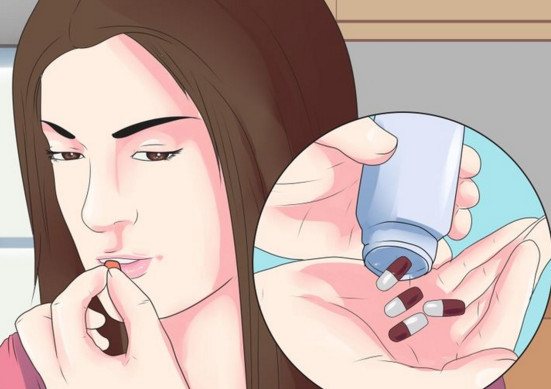
Manifestations of exacerbation of ulcers in adolescents and young adults are erased or similar to the symptoms of duodenal ulcers. The pain is mild, heartburn is present, complications are rare. In old age, the pain is also not pronounced, it is diffuse in nature, often radiating to the back, shoulder, and collarbone.
The risk group includes people whose work is associated with constant stress, who abuse smoking and alcohol. Also, exacerbation of ulcers is more common in people who do not adhere to a diet: they eat dry food, with long breaks, and often drink carbonated drinks. Fans of spicy and fried foods are also included in this group.
Who is most susceptible?

It has been noticed that very different reasons cause exacerbation of stomach ulcers, the symptoms and treatment in this case have their own characteristics.
People who abuse alcohol and smoking, as well as those who are influenced by frequent psycho-emotional stress, are susceptible to the manifestations of this gastric disease. In addition, the ulcer also worsens in those who do not adhere to a reasonable nutrition schedule, who eat dry food and on the run.
Because of this, men are more likely to get sick than women. Children and teenagers can also have ulcers, but the symptoms are less severe. The pain is not too intense, complications are rare, as a rule, because they receive medical care on time in the early stages of the disease. In older people, peptic ulcers do not occur so often; the symptoms of the disease are often vague; they do not always seek help on time, with all the ensuing consequences.
Causes of exacerbation of ulcers
Most often, stomach ulcers are aggravated by consuming large amounts of strong alcohol, carbonated drinks and severe stress. Other provoking reasons may be:
- eating too hot food;
- frequent smoking (on an empty stomach) while drinking coffee or strong tea;
- non-compliance with diet;
- severe injuries;
- taking medications such as aspirin, reserpine, ibuprofen, indomethacin, etc.;
- infections;
- physical stress.
Failure to comply with doctor's recommendations for taking medications and diet violations are most often observed during the period of remission. The pain “goes away” and a person with a peptic ulcer “relaxes”.
Symptoms
The main symptom of an exacerbation of an ulcer is pain. Its characteristic features are: dependence on the time of day and food intake. With a peptic ulcer, as a result of taking antacids and after vomiting, the pain disappears or decreases. Pain increases and decreases slowly (
15 min.) in contrast to cholelithiasis.
Depending on the time of eating, pain symptoms may be:
- early (30–60 minutes after eating);
- late (appears after 2 hours);
- “hungry” (occurs after 6–7 hours and goes away after eating);
- nocturnal (similar in character to “hungry”).
“Hungry” and night pains are more characteristic of duodenal ulcers. However, if the ulcer is located in the lower parts of the stomach, they can also be observed. The symptoms of the disease are more blurred the higher the ulcer is located.
Pain during exacerbation of a gastric ulcer is usually localized: to the left of the midline (unlike gastritis, where the pain is diffuse). Its perforation is indicated by prolonged pain radiating to the back.
Resistance to medications, changes in the rhythm of pain, manifestations of irradiation may indicate the occurrence of complications or the appearance of a concomitant disease.
In addition to pain, a stomach ulcer at the time of exacerbation can manifest itself with the following symptoms:
Dark-colored vomit and black stool may indicate internal bleeding.
How dangerous are the complications?
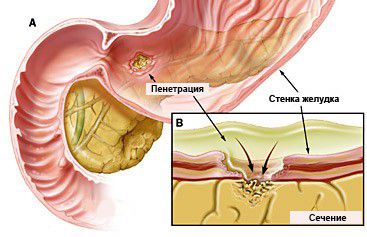
Constant relapses of stomach ulcers threaten negative consequences. If pre-medical care for a gastric ulcer is not provided in a timely manner, the following complications develop:
- The spread of ulcers to nearby organs and tissues. Often the pathology affects the pancreas.
- Stenosis of the pyloric lumen. This complication of peptic ulcer disease is characterized by narrowing in the area of the duodenum, as a result of which the patient is constantly bothered by bloating and a feeling of heaviness in the abdomen. When belching there is a rotten smell.
- Oncological disease of the stomach.
First aid for exacerbation of ulcers
When symptoms of exacerbation of an ulcer appear, the patient must be provided with semi-bed rest and psycho-emotional stability. Particular attention should be paid to the nature of the pain, its intensity and duration. Complications require hospitalization. Sharp pain with rapid deterioration of the condition may be evidence of perforation of the ulcer. Vomiting blood – internal bleeding. You should urgently call a doctor.
Pharmacological agents
First aid consists of quickly eliminating the symptoms of an exacerbation and providing conditions for the healing of the ulcer. Bismuth preparations and antacids will help get rid of pain. This:
If these remedies do not help, you can take antispasmodics (Papaverine, No-Shpa) or anticholinergics (Gastroceptin, Metacin). Your doctor will prescribe antibiotics and other anti-ulcer medications. After you feel better, you should definitely visit a doctor and undergo the necessary examination.
Folk remedies
If you do not have the necessary medications at hand, an attack of exacerbation can be relieved with folk remedies. Soda is often used internally, but it is a strong antacid and leads to side effects.
Warm milk, honey solution, and rosehip will help relieve pain. The latter is considered a very strong, radical remedy for exacerbation of gastric ulcer. It is used to eliminate pain symptoms from internal bleeding, promoting healing.
Herbs also have an analgesic and enveloping effect: calamus, chamomile, caraway, sage, lemon balm, sweet clover, oats, orchis.
Features of the disease
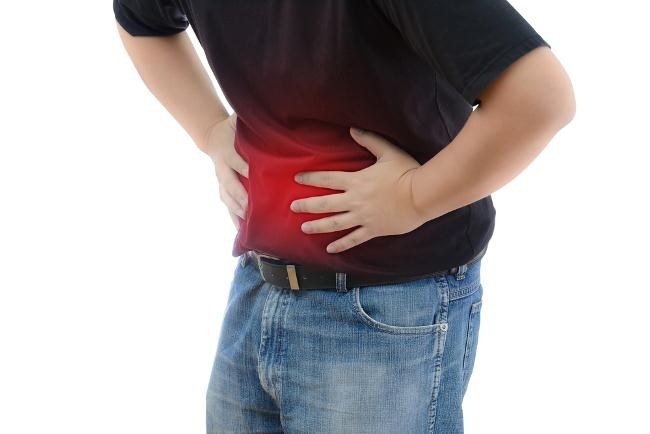
A stomach ulcer is a chronic disease when ulcers form on the lining of the digestive organ for various reasons. It should be noted that not only the mucous, but also the muscular layer of the stomach wall is subject to the pathological inflammatory-destructive process. Therefore, in case of a stomach ulcer, treatment should be urgent, since the consequences of the disease threaten the patient’s life. These consequences include:
- Perforation of the stomach (perforation), when the contents of the digestive organ enter the abdominal cavity, causing inflammation of the peritoneum, called peritonitis. The patient experiences sharp, severe pain, possibly with loss of consciousness due to painful shock.
- Penetration, when neighboring organs are involved in the inflammatory process, which, due to their anatomical location, cover a perforating gastric ulcer. Clinically, patients become heavier: the temperature rises, the pain becomes more intense, sharper, and symptoms from a neighboring organ are disturbing. If it is the pancreas, then the pain changes character (becomes constant, unbearable), localization (spreads to the left hypochondrium and left side, acquiring a girdling character), the symptoms of dyspepsia worsen: nausea, vomiting, heaviness and bloating. If it is in the liver, it is characterized by diffuse acute pain localized in the right hypochondrium and epigastrium.
- Stomach bleeding is also a very dangerous phenomenon, which, like the first two, requires urgent emergency treatment measures, since there is a threat to life. The complication is accompanied by vomiting blood, black stools, tachycardia, a drop in blood pressure and, possibly, loss of consciousness.
- Malignization (transition to an oncological form) - this occurs more often with ulcers that do not heal for a long time. Warning symptoms: a person loses appetite, weight, an aversion to meat appears, and the temperature rises slightly.
- Pyloric stenosis is a result of long-term and frequent ulcers in this part of the stomach, when food stagnates in the digestive organ, causing putrefactive processes. It manifests itself as heaviness, “rotten egg” belching, nausea, vomiting, which brings relief.
A person may not suspect for a long time that he has a stomach ulcer; with a stomach ulcer, especially against the background of existing gastritis, the symptoms may be the same, and a change in their severity may not alert the patient. In such cases, you should be very attentive to your health and know that all existing symptoms of gastritis with an ulcer will worsen: they become more intense and severe. The course of peptic ulcer disease is chronic, with periods of remission and exacerbation.
Diet selection
There are previously approved special anti-ulcer diets: 1a, 1b and 1. Despite foreign studies claiming that bans on certain foods can provoke additional stress, these diets are still used today. Russian scientists supplemented the diet by increasing the protein and fat content. The principles of dietary nutrition have remained unchanged.
Diet principles
The anti-ulcer diet is based on the principle of sparing the stomach. Thermal sparing involves eating food with a temperature from 15 ̊ C to 60 ̊ C. Chemical sparing excludes foods that lead to increased secretion. Mechanical requires eating food in pureed and liquid form.
There are other dietary principles for exacerbation of gastric ulcers:
- frequent meals;
- small portions;
- don't eat at night.
It is necessary to remove from foods: sweet, fatty, spicy, salty, coffee, carbonated drinks, strong tea, all types of broth (including vegetable broth), alcohol, canned food.
Folk wisdom to help
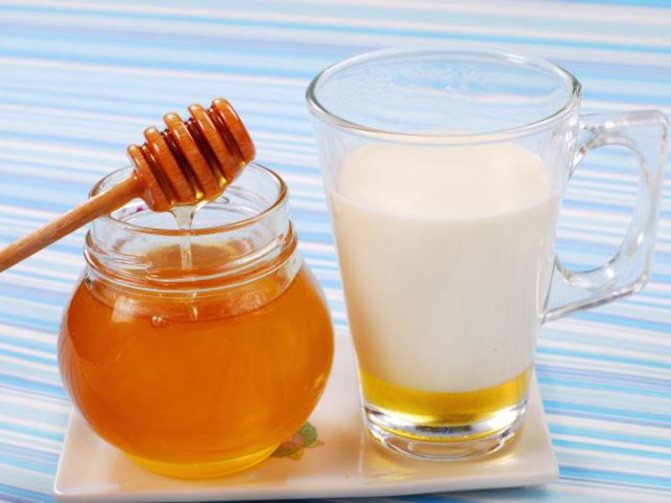
If there are no medications at hand, and the pain clearly indicates a possible ulcer, you should resort to traditional methods.
A good remedy for pain relief is warm milk, preferably with honey. Rosehip decoction is also an excellent remedy not only for relieving pain, but also for healing ulcers of both the digestive organ and intestines.
Herbs such as lemon balm, chamomile, cumin, sage, oats, calamus, etc. relieve pain and relieve inflammation.
And, of course, you need a strict diet that will not injure or irritate the damaged mucous membrane. Nutrition principles are also important:
- eat pureed, liquid food so as not to injure the stomach;
- you need to eat often and in small portions;
- Don't eat before bed.
Sample menu
The menu compiled on the basis of the main principles of the diet will depend on the severity of symptoms, the presence of complications and change as you recover. In the first week after the onset of attacks, you will need diet No. 1a, the next 10 days (approximately) - No. 1b. After another week, diet No. 1 is introduced. Below are 3 menu options.
Diet No. 1a
First breakfast: porridge with milk (semolina, rice, oats), steam omelette, rose hips (decoction);
Second breakfast: soft-boiled egg, jelly;
Lunch: slimy semolina, rice or oatmeal soup, steam soufflé (from lean fish, meat, poultry), milk;
Afternoon snack: steamed cottage cheese soufflé, jelly;
Dinner: chicken soufflé, rosehip;
Salt consumption is limited to 5 g. You can add cream and a little butter.
Diet No. 1b
Add white bread in the form of crackers (no more than 100 g). Meat, poultry and fish are prepared in the form of meatballs and steam cutlets. Milk soups are more varied.
First breakfast: oatmeal porridge with milk, rosehip decoction;
Second breakfast: crackers, jelly;
Lunch: milk soup with small noodles, meatballs, jelly;
Afternoon snack: crackers or mashed cottage cheese, jelly;
Dinner: fish (or poultry) soufflé, rose hip decoction;
Diet No. 1
Meat, poultry and fish can be cooked in pieces. Vegetable soups and vegetable purees are introduced, as well as dill and parsley. Allowed: yesterday's bread (white), mild cheese, sour cream, jam, apples, dry cookies. The following are prohibited: broths, sauces (except fruit), spices, as well as fried and salted foods.
First breakfast: omelet, cookies, rosehip broth;
Second breakfast: cheese, jelly, apple;
Lunch: vegetable soup, meatballs, bread, compote;
Afternoon snack: berry soufflé, rose hip decoction;
Dinner: boiled fish, rose hips;
Menu options shown are approximate. When composing your diet, you need to adhere to your own preferences and body characteristics. For example, if you have intolerance to milk or fish.
It is advisable to adhere to the basic principles of the diet during remission, especially in early spring and autumn, in order to prevent exacerbation of stomach ulcers. You just need to pay attention to your body, and it will respond with good health and excellent well-being.
Reason 4. Increased acidity of gastric juice
Antidote : dishes that bind excess acid - soft-boiled eggs, meat and fish, milk. Cheeses that serve this purpose well are Adyghe, Suzdal, Brie, Camembert, as well as processed light cheese.
But unleavened cottage cheese is considered a real medicinal dish, which in early autumn it is advisable to include in the menu 2-3 times a week. The recipe is simple: add half a liter of kefir to a liter of just boiled milk. After cooling, place on a sieve or cheesecloth - and the cottage cheese is ready. It’s even better to add fermented milk calcium instead of kefir, which can be purchased at the pharmacy: 1 level teaspoon per liter of boiled milk. Cottage cheese obtained in this way enriches the body with calcium, preventing the development of osteoporosis.

